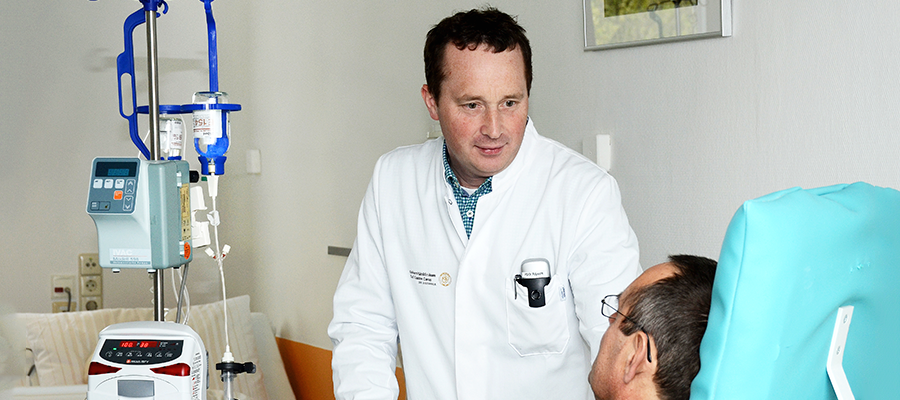1 year in, SPECTAcolor is a viable cancer research model!
19 Sep 2014
The EORTC is pleased to announce the successful implementation of SPECTAcolor, ‘Screening Patients for Efficient Clinical Trial Access’ – the first Pan European collaborative molecular screening platform for colorectal cancer patients. SPECTAcolor proves the logistical feasibility of the infrastructure that was built to run next generation trials in a multinational setting.
Now one year into operation and with already over 400 patients enrolled, the screening platform has exceeded its initial accrual targets within a network of 29 clinical centers located in ten countries: Belgium, Cyprus, France, Germany, Greece, Italy, Portugal, Spain, Sweden, and Switzerland. The research team is pleased to announce that the platform is running smoothly and that all parameters are now in place.
Dr. Gunnar Folprecht of the Universitätsklinikum Carl Gustav Carus in Dresden and co-Coordinator of this project says, “This is a true success. We have demonstrated that such a collaborative molecular screening platform is feasible. SPECTAcolor has accrued patients, collected tissue samples, and developed the logistics needed to have these human biological materials centrally stored and analyzed. This success will enable SPECTAcolor to design and conduct downstream clinical trials tailored to subsets of patients with specific molecular characteristics.”
Molecular diagnostics can identify subgroups of colorectal that are relevant for the mode of action of new anti-cancer agents.
Prof. Sabine Tejpar of the Universitair Ziekenhuis in Leuven and co-Coordinator of this project adds, “The analysis of the tissue samples we are collecting and the associated clinical data will improve our understanding of the disease biology. Importantly, though, this is possible because we have a platform that maximizes technical and scientific expertise and has established quality assurance. SPECTAcolor will produce data that can be used by multiple partners working together to improve treatments for patients with colorectal cancer.”
Bolstered by the first year achievements, SPECTAcolor is now in the process of extending its network to overseas intergroup collaborations.
Colorectal cancer– Cancer of the colon and rectum – remains the 2nd most frequently encountered cancer worldwide and the 2nd leading cause of European cancer-related deaths. In the past, colorectal cancer was considered a single disease. Now, thanks to the mapping of the human cancer genome, there are recognized differences between patients concerning the particular genetic makeup of their colorectal cancer. This is the reason why scientific leaders at EORTC created SPECTAcolor – a human biological sample screening platform to allow differentiation of tumours according to the latest scientific knowledge. This marks a new way to perform clinical research and personalized medicine, now available to patients throughout Europe.
This is a first, because the complexity and burden of the required testing is rapidly outgrowing the possibilities of single institutions or countries.
SPECTAcolor cancer research model is two-fold in the sense that it is not only a platform to enable molecularly stratified trials but also a research platform to identify novel prognostic and predictive tumor markers.
How is this cancer screening realized? Upon patients’ consent, archival samples of the primary tumor are centralized in the Dresden University Clinic, Germany for central quality and pathological review prior to nucleic acid extraction. Samples are then forwarded to the Wellcome Trust SANGER Institute of Cambridge, in the UK where further analysis of 360 key cancer driver alterations is performed, using NGS. As science evolves and further markers become relevant to stratify the disease, these will be added to the analysis panel, all supported by central review of the material for suitability. Similarly, according to evolving insights on the use of metastatic samples or circulating DNA, the material collected in the platform can be adapted.
For this platform, adult patients with pathologically confirmed metastatic colorectal cancer (any T; pN2; pT 3-4; pN1) with no more than two previous palliative lines of treatment are invited to give their informed consent to test for relevant molecular alteration.
Partnership with the European Society of Pathology with the already existing active collaboration and supervision of the the EORTC PathoBiology Group allows adoption of the best practices and standardized procedures for histopathology review and human biological material handling and biobanking. EORTC software will collect associated clinical data on the outcome of the patients during the course of their treatment for the disease, whether in trials or under standard of care.
SPECTAcolor has prompted the initiation of other cancer histology platforms through the EORTC led SPECTAprogram. These new cancer research platforms will be launched in early 2015 starting with SPECTAlung, specializing in thoracic tumors, and SPECTAbrain, for patients with glioblastoma, a form of brain cancer.
SPECTAcolor is supported by the EORTC Charitable Trust and the corporate social responsibility program of Alliance Boots. The EORTC recognizes the European Society of Pathology and the Sanger Institute for their active and high quality contributions.
Denis Lacombe, EORTC Director Headquarters
Mathilde Fenoulhet; EORTC Fundraising Project Coordinator

Related News
EORTC: Advancing research and treatment for rare cancers
29 Feb 2024
EORTC Fellowship Programme: celebrating more than 20 years of impactful collaboration
22 Feb 2024
Appointment of Malte Peters as EORTC Strategic Alliance Officer
9 Feb 2024
Unique series of workshops in partnership with the European Medicines Agency (EMA)
7 Feb 2024
EORTC launches a prominent clinical trial in older patients with locally advanced (LA) HNSCC (Head and Neck Squamous Cell Carcinoma)
14 Dec 2023
Seven IMMUcan abstracts selected for ESMO Immuno-Oncology Congress 2023
6 Dec 2023
EORTC Quality of Life measures integrated in CDISC
20 Nov 2023
EORTC and Immunocore are collaborating to launch the ATOM clinical trial of tebentafusp in Adjuvant Uveal Melanoma
7 Nov 2023
Treatment with decitabine resulted in a similar survival and fewer adverse events compared with conventional chemotherapy in older fit patients with acute myeloid leukaemia
31 Oct 2023
New results and forthcoming EORTC trials in rare cancers, lung, head and neck, and breast carcinomas presented at ESMO 2023
20 Oct 2023


